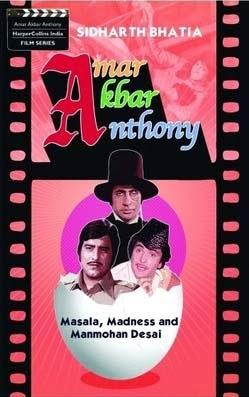 Once
in a while a book comes along that makes you want to give up reading. It makes
you cringe because while it has its heart in the right place, some very basic
aspects of writing a book are ignored, resulting in it being close to torture.
Once
in a while a book comes along that makes you want to give up reading. It makes
you cringe because while it has its heart in the right place, some very basic
aspects of writing a book are ignored, resulting in it being close to torture.
Amar Akbar Anthony – Masala, Madness and Manmohan Desai (AAA-MMM) is one such book. It tries to capture the multi-starrer craze of the 70s and 80s in Indian cinema and use the popularity of AAA-MMM as a guiding point for the same. It is also a study of a film that broke many cinematic religious barriers and in the process gave us some of the most memorable characters of Bollywood. Lastly, the book is homage to a director, Manmohan Desai, who had a rather authoritarian style of directing and believed in the concept of “my way or the highway”, yet he had stars wanting to work with him without listening to the story of the film and he gave us some of the biggest hits ever to grace the cinema screens of this nation.
So then what went wrong? A book that has so much going for it must have something horribly off beam to make me say the things I did about it in the opening paragraph. The question I suppose isn’t what went wrong, rather where do I begin?
The most annoying aspect of the book is that it is repetitious. Entire sentences are repeated sometimes three times during the length of the book. It would seem that the author, Sidharth Bhatia, is under the impression that his audience cannot even remember the simplest of observations over a few pages. I would have accepted these repetitions had the book been a 700-1000 page book, but with close to 150 pages, which results in a 2-3 hour read for a slow reader like me, there were times I could not help but mentally shout at the author and say, “I get it, you’ve said that already, twice before, now move on”. So yes, the editor needs a sacking in this case. This also unfortunately gives the impression that the book was put together in haste, and seems like the people behind it were unwilling to devote time and energy on it. In comparison one must take note of books by the same publisher and in the same film series, like those on Jaane Bhi Do Yaaron and Gangs of Wasseypur, both intensively researched and brilliantly put forth.
If the repetitions weren’t enough we are also made to go through the entire abridged story of the movie in a separate chapter. My issue with this chapter is that who does it really serve? The people who are fans of the film and have seen it countless times in their childhood, like myself, are still aware of the events in it even though we haven’t seen it for years. Those who haven’t seen the film might just get by, but then the book is redundant for someone like that because you need some basic idea about the film to really enjoy the stories behind the making. This brings us to the people who have seen the film, but do not remember it. These are the only ones who would benefit from this chapter, and dare I say once again the reader is looked down upon by the author in this respect.
Now, I do agree that the sub-title of the book is Masala, Madness, and Manmohan Desai, but having said that too much time is spent on discussing the director rather than the film. Most the cast interviews, some missing like that of Vinod Khanna without any explanation, also focus mostly on the impact and influence of Manmohan Desai on this film and other films in general. When writing about a book, I would have hoped that a more rounded point of view was taken where we would get more inside stories about the actual making.
However, the book is not entirely a lost cause. It does rejuvenate a forgotten era in the minds and hearts of those that were part of it growing up. I am not sure if the book would appeal to the younger generation and will make them explore similar cinema classics. There are anecdotes and stories to tell, all of which makes for an entertaining read. There are however no big revelations so those looking for gossip between the pages are likely to be disappointed.
Amar Akbar Anthony is a classic film that deserved a little bit more serious attention than what it gets in Masala, Madness and Manmohan Desai.
Recommendation: Only for die-hard fans of the film, and while the book will make you want to re-watch the film, you will have to keep your cool while reading it. Medication to control your blood pressure is advised before commencing to read the book (Please consult your doctor before taking any medication).

